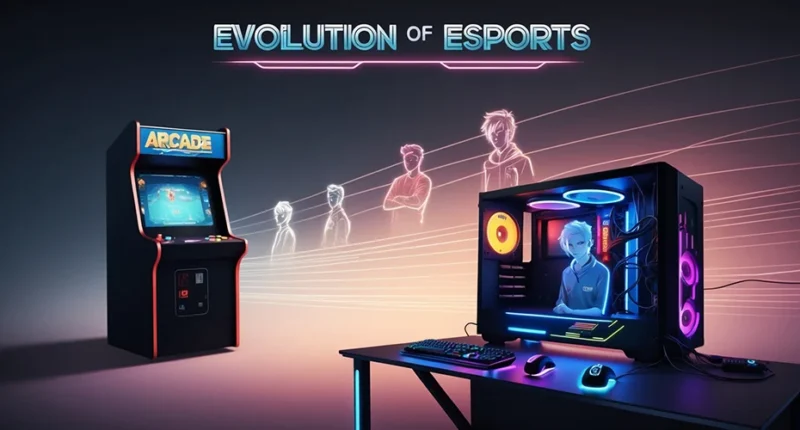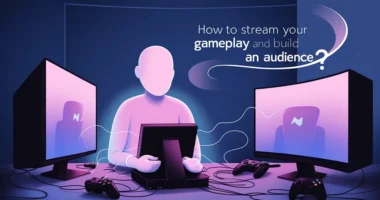Table of Contents
Esports, short for electronic sports, refers to competitive video gaming, where professional players or teams compete against each other in various games. Over the past two decades, esports has transformed from a niche hobby to a global phenomenon, drawing millions of viewers and players. Let’s explore how esports has evolved and why it’s becoming more popular each year.
The Early Days of Esports
Esports started to gain attention in the late 1990s and early 2000s, when online multiplayer games like StarCraft and Quake became popular. At this point, competitive gaming was mostly an underground activity, with small tournaments held in gaming cafes and online. The internet played a huge role in this era, allowing players from different parts of the world to compete against each other in real-time.
One of the earliest significant moments in esports was the launch of the World Cyber Games in 2000. This global tournament featured players from around the world and helped bring competitive gaming into the spotlight. Despite being a small event compared to today’s standards, it showed that there was a growing interest in gaming as a competitive activity.
The Rise of Online Streaming and Big Tournaments
As technology improved, esports continued to grow. In the mid-2000s, platforms like Twitch and YouTube Gaming allowed gamers to broadcast their gameplay to audiences online. This shift from in-person tournaments to online streaming made esports more accessible to both players and viewers. Now, anyone with an internet connection could watch live tournaments and cheer for their favorite players or teams from anywhere in the world.
By the late 2000s and early 2010s, major esports tournaments started offering substantial prize money, further boosting the appeal of competitive gaming. Games like League of Legends, Dota 2, and Counter-Strike: Global Offensive became the backbone of professional esports, attracting large audiences and high-profile sponsorships. The International (Dota 2’s flagship tournament) became one of the highest-paying tournaments in esports, with prize pools reaching tens of millions of dollars.
Esports Goes Mainstream
The 2010s saw esports move from the online world into traditional sports venues, with large-scale tournaments held in arenas that were once reserved for concerts and sporting events. These tournaments often sold out within minutes, and the crowds would fill massive arenas to watch gamers battle it out live. Esports became a spectator sport, much like traditional sports such as football or basketball, with commentators (or “casters”) narrating the action for viewers.
Major brands and companies, including tech giants like Intel, Coca-Cola, and Nike, began to invest heavily in esports. These sponsorships helped legitimize esports as a professional industry. Esports teams started to sign contracts with players, and gaming organizations became recognized as legitimate businesses.
Esports’ growth didn’t stop there. In 2020, the International Olympic Committee (IOC) acknowledged esports as a potential Olympic sport, further cementing its place in the global entertainment landscape. Though it hasn’t yet become part of the Olympics, it shows how esports is being recognized on a larger scale.
The Rise of Esports as a Career
As esports grew in popularity, it also became a viable career option for many players. Today, esports athletes can make significant amounts of money, not only from tournament winnings but also from sponsorships, streaming, and merchandise sales. Successful players are now seen as celebrities, with large fan followings on social media and platforms like Twitch and YouTube.
Esports has also created a whole ecosystem of jobs beyond players, such as coaches, analysts, content creators, event organizers, and broadcasters. This growth has made esports a full-fledged industry with millions of dollars in revenue every year.
The Future of Esports
Looking ahead, esports is expected to continue its upward trajectory. With growing global interest, more games are being developed specifically for esports competitions. Games like Fortnite, Valorant, and Apex Legends have added to the already extensive list of popular esports titles.
Esports is also expanding into educational settings, with colleges and universities offering scholarships and dedicated programs for aspiring players and esports professionals. In fact, some schools now host their own esports leagues, allowing students to participate and compete in organized tournaments.
The rise of virtual reality (VR) and augmented reality (AR) also holds promise for esports. As technology improves, new, more immersive gaming experiences may change the way esports tournaments are held and how fans interact with the games and players.
Why Esports Is So Popular
So, what makes esports so appealing to people? There are several factors:
- Accessibility: Anyone with a gaming device and an internet connection can participate or watch esports. This makes it easy for people from all walks of life to get involved.
- Entertainment Value: Esports is fast-paced and exciting to watch. Much like traditional sports, there are thrilling moments that keep viewers on the edge of their seats.
- Community: Esports has created a global community of fans and players who share a love for gaming. This sense of belonging adds to the appeal of competitive gaming.
- Money and Fame: For those who are highly skilled, esports offers a chance to make money and gain fame, just like athletes in traditional sports.
Conclusion
The rise of esports has been nothing short of extraordinary. From humble beginnings as a hobby for a select few, esports has grown into a global industry with millions of fans and professional players. As technology continues to advance and gaming becomes an even more mainstream part of global entertainment, the future of esports looks incredibly bright. Whether you’re a player or a fan, there’s never been a better time to get involved in this exciting world.











